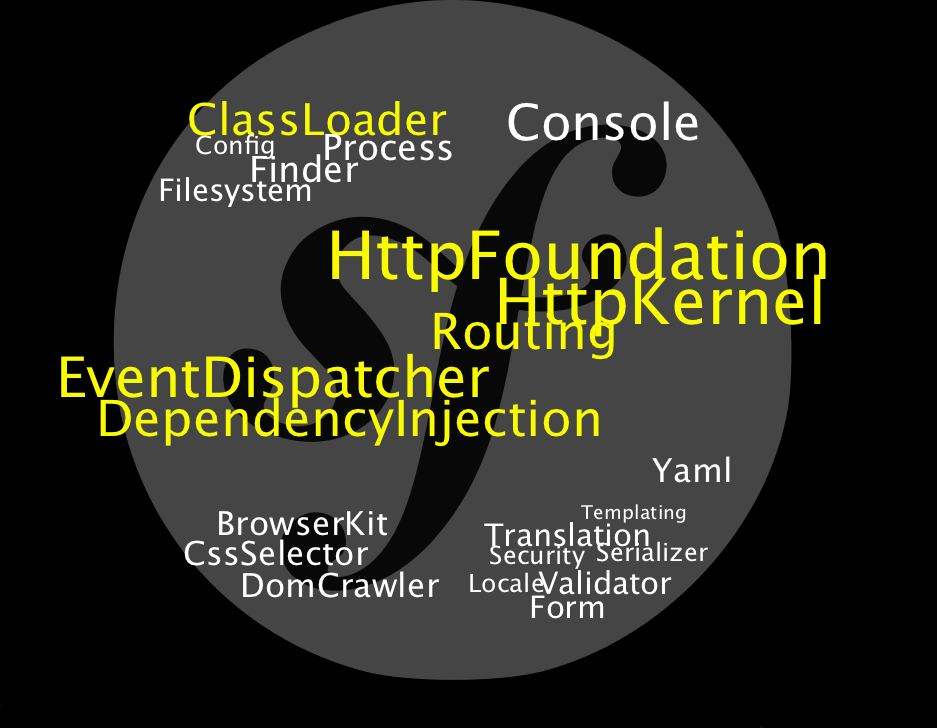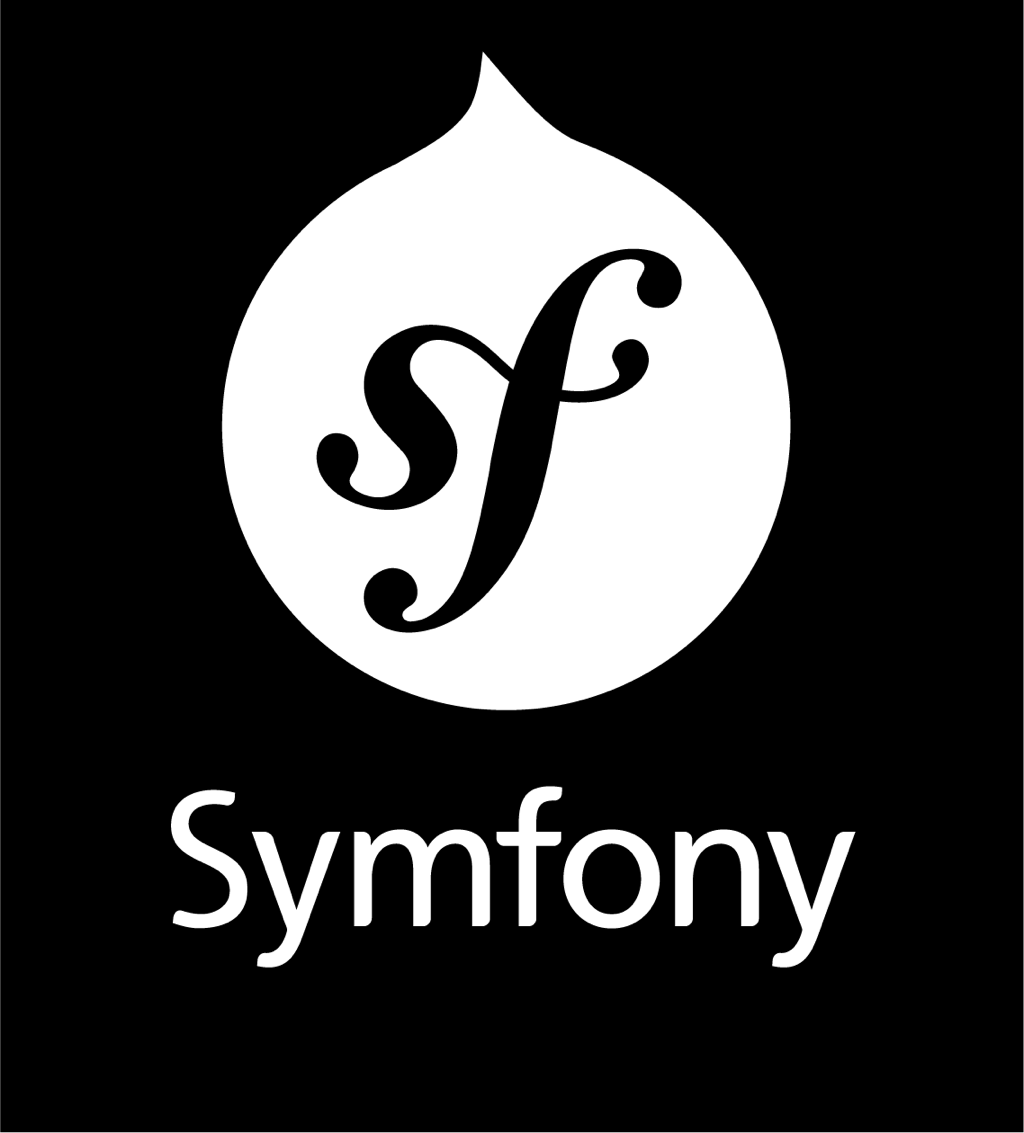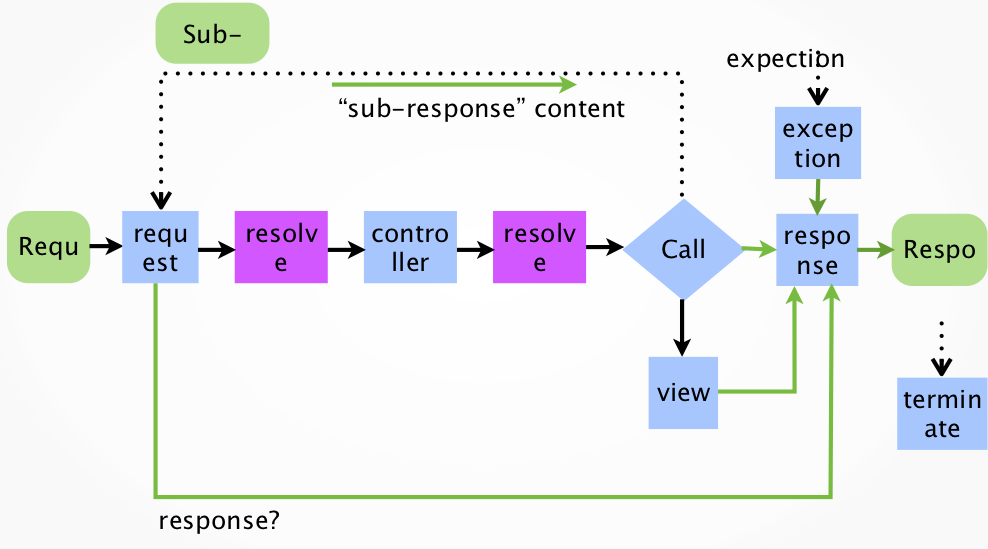@Crell

- Senior Architect, Palantir.net
- Drupal Association Advisor
- Web Services & Context Initiative Owner
- Co-Author,
Drupal 7 Module Development,
Packt Publishing - Architectural Gadfly
- Nerf Gunslinger




The Web Services and Context Core Initiative (WSCCI) aims to transform Drupal from a first-class CMS to a first-class REST server with a first-class CMS on top of it. To do that, we must give Drupal a unified, powerful context system that will support smarter, context- sensitive, easily cacheable block-centric layouts and non-page responses using a robust unified plugin mechanism.



01 | namespace Symfony\Component\HttpKernel; |
02 |
03 | interface HttpKernelInterface { |
04 | /** |
05 | * Handles a request. |
06 | * |
07 | * @param Request $request |
08 | * A request instance |
09 | * @return $response |
10 | * A Response instance |
11 | */ |
12 | function handle(Request $request, $type = self::MASTER_REQUEST, $catch = true); |
13 | } |

url())1 | use Symfony\Component\HttpFoundation\Response; |
2 |
3 | $response = new Response('No page. :-(', 404, array( |
4 | 'Content-Type' => 'text/plain', |
5 | )); |
6 |
7 | $response = new Response(); |
8 | $response->setContent('Hello World'); |
9 | $response->send(); |
01 | use Symfony\Component\HttpFoundation\StreamedResponse; |
02 |
03 | $response = new StreamedResponse(function () { |
04 | echo 'foo'; |
05 | flush(); |
06 | echo 'bar'; |
07 | }); |
08 |
09 | // Later |
10 | $response->send(); |
Like hooks, but
01 | use Symfony\Component\EventDispatcher\EventDispatcher; |
02 |
03 | $dispatcher = new EventDispatcher(); |
04 |
05 | // Somewhere... |
06 | $callable = function (Event $event) { |
07 | // do something |
08 | }; |
09 | $dispatcher->addListener('event_name', $callable); |
10 |
11 | // Equivalent of module_invoke_all(). |
12 | $dispatcher->dispatch('event_name', new Event()); |
01 | class PlusOneSubscribe implements EventSubscriberInterface { |
02 |
03 | public function onMyEvent(Event $event) { |
04 | // Do stuff |
05 | } |
06 |
07 | static function getSubscribedEvents() { |
08 | $events['event_name'][] = array('onMyEvent'); |
09 | return $events; |
10 | } |
11 | } |
12 |
13 | $dispatcher->addSubscriber(new PlusOneSubscribe()); |
01 | use Drupal\Core\DrupalKernel; |
02 | use Symfony\Component\HttpFoundation\Request; |
03 | use Symfony\Component\EventDispatcher\EventDispatcher; |
04 | use Symfony\Component\HttpKernel\Controller\ControllerResolver; |
05 |
06 | // Create a request object from the HTTPFoundation. |
07 | $request = Request::createFromGlobals(); |
08 |
09 | $dispatcher = new EventDispatcher(); |
10 | $resolver = new ControllerResolver(); |
11 |
12 | $kernel = new DrupalKernel($dispatcher, $resolver); |
13 | $response = $kernel->handle($request); |
14 |
15 | $response->prepare($request); |
16 | $response->send(); |
17 | $kernel->terminate($request, $response); |
New routing syntax (farewell hook_menu()?)
01 | function example_route_info() { |
02 | $routes['node_page'] = array( |
03 | 'route' => new Route('/node/{node}', array( |
04 | '_controller' => 'NodeController:show', |
05 | )), |
06 | // This gets objectified later... |
07 | 'access' => array( |
08 | 'callback' => array('function' => 'node_access'), |
09 | 'arguments' => array('view'), |
10 | ), |
11 | ); |
12 | return $routes; |
13 | } |
14 |
15 | class NodeController { |
16 | public function show(Node $node) { |
17 | // ... |
18 | return new Response($content); |
19 | } |
20 | } |
01 | function example_route_info() { |
02 | $routes['blog_list'] = array( |
03 | 'route' => new Route('/blog/{page}', array( |
04 | '_controller' => 'BlogController:show', |
05 | 'page' => 1, // Default value |
06 | ), array( |
07 | 'page' => '\d+', |
08 | '_method' => 'GET', |
09 | )), |
10 | // This gets objectified later... |
11 | 'access' => array( |
12 | 'callback' => array('function' => 'node_access'), |
13 | 'arguments' => array('view'), |
14 | ), |
15 | ); |
16 | return $routes; |
17 | } |
18 |
19 | class BlogController { |
20 | public function show(Request $request, $page) { |
21 | // Link to router items, not random URLs. |
22 | $link = $this->generator->generate('node_page', array('node' => 5)); |
23 | // ... |
24 | return new Response($content); |
25 | } |
26 | } |
A large part of WSCCI is simply paying down years of
technical debt.
That means we can do other cool things.
drupal_set_message()